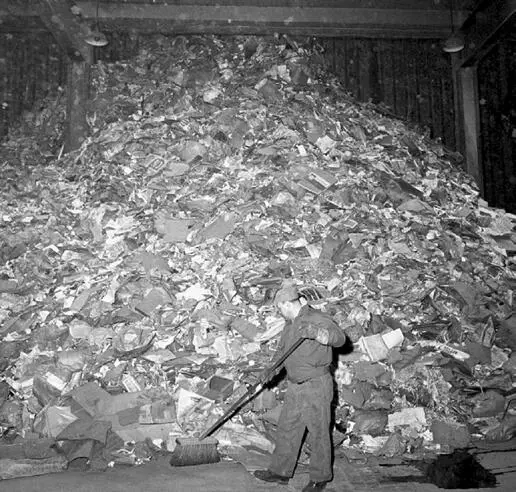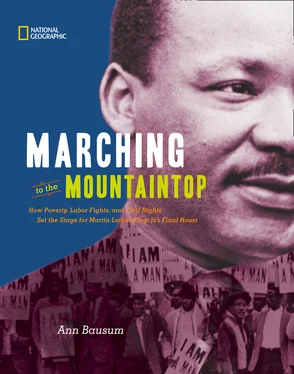“Nobody listens” to black people, observed Maxine Smith, executive director of the Memphis branch of the NAACP. “Nobody listened to us and the garbage men through the years. For some reason, our city government demands a crisis” before noticing African-American concerns.
Whites may not have seen it coming, but a crisis of epic proportions loomed on the horizon for Memphis, Tennessee.

“I’m ready to go to jail,” announced union organizer T. O. Jones.
“Why are you going to jail?” asked Charles Blackburn.
Jones, having excused himself to change into khaki pants—jail clothes—reminded the new public works director of the court injunction that prohibited strikes by Memphis public workers. Blackburn had offered no resolution of the list of demands Jones had just shared with him, demands that he had developed earlier that evening during a meeting with more than 700 department workers. Key principles included union recognition, pay increases, overtime compensation, full employment regardless of weather, and improved worker safety. Now Jones knew the men would strike.
“Oh, workers can you stand it? Oh, tell me how you can.
Will you be a lousy scab, or will you be a man?
Which side are you on, oh, which side are you on?
Which side are you on, oh, which side are you on?”
Verse from a labor song written in 1932 by Florence Patton Reece, a coal miner’s wife
Among the ways mayor Henry Loeb (above, walking with striking workers to their February 13 meeting) offended blacks was to mispronounce Negro , the era’s term for African Americans, as the racism-laced Nigra . In 1968 blacks refused to contribute their garbage for collection by strike-breaking workers. Uncollected, the waste accumulated by the week (above).
“H e gives us nothing, we’ll give him nothing,”yelled one of the men when waiting workers learned of Blackburn’s stance. Those gathered held no official vote on whether or not to strike; they just reached a collective agreement to quit working. Maybe city officials would take notice if the garbage stopped being picked up and road repairs ceased.
The next morning, empty work barns must have erased whatever illusions Blackburn held about the submissiveness of his workforce. Only 170 of the city’s 1,100 garbage workers reported for duty on Monday, February 12. Just 16 members of the 230-man street crew appeared. Almost without warning, more than 85 percent of the workforce had failed to show up for work. The numbers were even worse the next day. Some workers had reported on Monday because they hadn’t heard about the strike. Now they joined the walkout, too. Peer pressure kept others off the job. If employees kept working, they knew they’d hear about it back in the neighborhoods and churches they shared with the strikers. Better to stay home. Hundreds of enthusiastic men rushed to join the union.
Public Works Director Blackburn struggled to organize his skeletal workforce into the five-man crews required to run a garbage truck. On Monday he managed to staff 38 garbage trucks, leaving as many as 150 vehicles idle for the day. By Wednesday he could fill only four. Every truck required a police escort in order to ensure that striking workers wouldn’t harass those few men who had stayed on the job.
P. J. Ciampa groaned at his AFSCME office on Monday when he learned of the Memphis walkout. This veteran organizer of countless labor strikes knew the Memphis timing was all wrong. Garbage strikes worked best in hot weather when garbage smelled its worst. Plus, city leaders would find it easy in February to hire unemployed agricultural workers to break the strike. And how were workers going to feed their families when their paychecks stopped coming? Usually union dues supported a strike fund, but Local 1733’s small membership base had created few assets. Furthermore, because southern business leaders and politicians disliked unions, the South was the hardest place to win a strike. On top of it all, in the face of an unexpected strike, public support would probably favor the newly elected leaders of Memphis. Never strike in anger, AFSCME officials always advised, and strike only when victory is certain. The Memphis strike looked like a disaster.

Holes peppered the corroded bottoms of many city-supplied washtubs, so garbage slop dripped onto the bodies and clothes of sanitation workers as they toiled. Tubs rested unused (above) during the 1968 strike. The Memphis action began just as a nine-day garbage strike ended in New York City (above, sweeping up some accumulated trash).
Tell the men to go back to work, Ciampa told Memphis labor leader Bill Ross by telephone. Ross refused, explaining that he had never seen such a determined group of men. “I said, buddy, I’m the only one white man in this building with 1,300 black souls out there. I’m not about to go out there and tell those people to go back to work. Now if you want to tell them to go back to work, you come down here and you do it yourself.”
Almost immediately the AFSCME field director flew to Memphis. By Monday night, three other AFSCME staffers had arrived, including Bill Lucy, a black Memphis native pulled from an assignment in Michigan. After meeting on Tuesday with Mayor Henry Loeb and with a room full of striking workers, Ciampa realized that nobody, not even T. O. Jones, could have stopped the strike. Jones “had to run to stay out front,” Ciampa would later say.
Ciampa could find no common ground with the mayor. Loeb insisted that negotiations take place in front of news reporters, a tough environment for reaching the compromises necessary for strike settlements. Ciampa sized up Loeb as insincere, close-minded, and happy to make comments that played well to his white citizen base while avoiding serious negotiation. Meanwhile, Ciampa, a tough-talking negotiator with an Italian-American accent, struck Loeb as rude and intrusive, and Ciampa’s assertive northeastern style grated against other whites, too. After Ciampa directed a few choice comments at the mayor—“Oh, put your halo in your pocket and let’s get realistic”; “Because you are mayor of Memphis it doesn’t make you God”; and “Keep your big mouth shut!”—orange bumper stickers reading “Ciampa Go Home” appeared all over Memphis. Within days AFSCME international director Jerry Wurf would decide to take personal charge of the negotiations, leaving Ciampa to coordinate strategy regarding the workers.
Traditionally, striking workers would set up picket lines and march with protest signs at their places of work. Replacement laborers, known as scab workers, would have to “cross the picket lines” and face verbal harassment by strikers in order to get to work. But Ciampa’s team and local union leaders worried that this aggressive approach might backfire in the racially charged South. They didn’t want to give members of the city’s almost entirely white police force an excuse to attack black strikers. Instead, strike organizers turned to tried-and-true forms of nonviolent civil disobedience: mass meetings, peaceful marches, boycotts, and so on. Such strategies had worked in past labor fights and were central to the ongoing civil rights movement led by Martin Luther King, Jr.
Читать дальше













